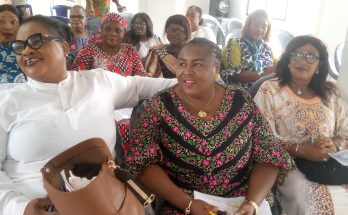In this report, ENE OSHABA xrays advocacy by the Chairman, Ekiti State House of Assembly Committee on Health and Human Services, Hon. (Princess) Adeteju Okuyiga, for women’s political participation and inclusion in governance in Nigeria.
Okuyiga’s political journey
In the Nigeria’s political landscape Hon. (Princess) Adeteju Okuyiga stands out as a formidable force, driving significant change and championing the cause of women in governance. Having served her first term as a member of the Ekiti State House of Assembly from June 6, 2019, to June 5, 2023, she is a second term member of the Assembly which commenced on June 6.
Hon. Okuyiga has made remarkable strides in her role as the Chairman, House of Assembly Committee on Health and Human Services.
Her dedication to public service, health, and women’s rights has been a beacon of progress and empowerment for members of her constituency and beyond.
Okuyiga, who as the Chairman of the House Committee on Health and Human Services, has spearheaded several legislative initiatives aimed at improving healthcare services, has also been instrumental in the enactment of policies that address the health needs of women and children, ensuring that healthcare systems are more accessible and responsive to the community’s needs.
Notable achievements include: sponsoring bills promoting education, healthcare, and economic empowerment for marginalized communities.
Others include, advocacy for increased funding for infrastructure development and social welfare programs.
Similarly, she has collaborated with stakeholders to establish vocational training centers for youth and women.
In the same vein, she facilitated community engagement initiatives, fostering dialogue and inclusive decision-making.
Hon. Okuyiga’s impact was notably highlighted during the 2021 Womanifesto Dialogue held at the University of Lagos. In her goodwill message, she underscored the critical issues of women’s safety and political participation, emphasizing the urgent need for reforms to create a more inclusive and secure environment for women.
Her address was a clarion call for greater gender sensitivity within political and social structures, advocating for the inclusion of women’s perspectives in security sector reforms and decision-making processes.
Throughout her tenure, Hon. Okuyiga has been at the forefront of advancing women’s rights and participation in politics.
She has consistently supported initiatives aimed at reducing violence against women and enhancing their representation in political offices.
Pioneering health reforms during her first tenure, Hon. Okuyiga spearheaded several health initiatives that have significantly improved the welfare of Ekiti state.
Women’s political participation
In contemporary Nigeria, the urgency of women’s participation in the political and socio-economic spheres cannot be overstated. As the country grapples with multifaceted challenges, from economic instability to social unrest, the inclusion of women in decision-making processes is not just a matter of equity but a necessity for sustainable development.
Despite comprising nearly half of the Nigerian population, women remain significantly underrepresented in political offices and leadership positions.
According to recent statistics, women occupy less than 10 per cent of elective positions. This stark disparity highlights the need for concerted efforts to bridge the gender gap in political participation.
It is on this ground that empowering women in politics has been a key area of advocacy for Hon. Okuyiga, as she continues to call on all stakeholders to action to achieve this across the country.
Speaking at a meeting organised by Womanifesto, recently, Hon. Okuyiga underscored the significance of scaling up dialogue across the country ahead of the election season.
She lauded the efforts of organisers, scholars, NGOs, CSOs, and activists who have worked tirelessly to make the Womanifesto movement a reality, noting that the collaborative spirit of women’s networks and their allies has been instrumental to women’s progress so far.
Womanifesto is a coalition of over 1,000 individual women and women’s institutions, group of women-led and women-focused organizations, under the auspices of the Feminist platform who articulated a Charter of Demands by Nigerian women.
The aim of the coalition is to uphold the dream of a Nigeria that protects, respects and remedies violations of women’s human rights, gender discrimination, and maintains zero tolerance to sexual and gender-based violence.
Why women’s participation matters
For Okuyiga, women’s participation brings diverse perspectives essential for comprehensive and balanced policy-making, adding that women often prioritise issues such as healthcare, education, and social welfare, which are crucial for societal well-being.
She noted that women participation accrues economic growth for women individually and for the nation in general; just as she disclosed that studies have shown that gender diversity in leadership leads to better economic performance.
“Women in leadership positions are known to champion inclusive economic policies that benefit a broader segment of society,” she explained.
Okuyiga stressed that ensuring social justice and equity through women’s participation was a matter of social justice as it aligned with global commitments to gender equality, such as the Sustainable Development Goals (SDGs), particularly Goal 5, which aims to achieve gender equality and empower all women and girls.
Women’s safety, security
While highlighting the pressing issues of women’s safety and security across Nigeria, the lawmaker noted the alarming rise in crime, the proliferation of weapons, and the violent power struggles among armed groups.
These conditions, she noted, have particularly dire consequences for women, who face targeted violence, harassment, sexual assault, and threats to their honour and reputation, even as these challenges were exacerbated by gender norms and Nigeria’s personal status laws.
“Politically active women, in particular, are at risk. Despite these dangers, there is a growing wave of vocal support from communities, including men, advocating for women’s safety and participation in public life,” she stated.
Speaking further Okuyiga noted that women played a critical role in conflict resolution and peacebuilding, stating that: “Their involvement in peace processes leads to more durable and long-lasting peace agreements. In regions plagued by conflict, women’s participation is essential for achieving and maintaining peace.”
The lawmaker, whose tenure has been marked by her unwavering commitment to improving security for women, has continued her advocacy for reforms that address women’s specific safety concerns, pushing for a political environment where women can participate without fear of violence or defamation.
Her efforts to reduce slander and promote media accountability are part of a broader strategy to ensure that women can engage in public life with dignity and respect.
“There is no gain saying women’s safety and security concerns across all six geopolitical zones of the country remains source of worry, not only among the women folks, but the entire society has reported concerns over rising crime, the widespread availability of weapons, and violent conflict over the balance of power between armed groups.
“In addition, women face targeted violence, encountering harassment, sexual assault, threats of violence, and slander,” she stated.
While pointing out that politically active men may face similar issues, threats associated with honour and reputation, she maintained that it presents a particular challenge for women owing to prevailing gender norms and the provisions of the personal status law in Nigeria.
“Women who are politically active, challenge conservative mores, or become publicly visible risk their reputations and sometimes their lives; but at the same time they are also experiencing more vocal support from communities, including from men,” she stated.
Role of women’s movements
Okuyiga noted that, women’s movements have been at the forefront of combating violence against women, advancing gender equality, and securing legislative and policy changes.
According to her, Nigeria has witnessed powerful examples of women’s mobilisation, such as the ‘Bring Back Our Girls’ campaign and cross-party efforts to end the marginalisation of women in political office.
She decried the fact that despite these successes, progress on women’s participation and leadership in politics and peace processes remains slow.
“The benefits of women’s involvement in peace and development are well-documented, yet a significant gap persists between this knowledge and the actions of stakeholders.
“Here in Nigeria, we can point to clear examples of the powerful impact of women mobilising around a common cause from the ‘Bring Back Our Girls’ campaign, to the ongoing mobilisation of women across party lines to strategize to end the lingering marginalization of women in elected and appointed political office(s).
“Despite the well documented positive impact of women and women’s organisations as enumerated above, progress on women’s participation and leadership in politics and peace processes is still lagging.
“The evidence linking women’s participation and leadership with peace and development is convincing and well known. But there is a significant gap between what we know and what we do as stakeholders,” she lamented.
Barriers to political participation
Hon. Okuyiga highlighted the multiple barriers that impede women’s political engagement.
“Fear of violence and crime limits women’s mobility and presence in public spaces, while harassment and slander deter them from activism and running for office. These threats are often manipulated by established political players to maintain the status quo, further marginalising women.
“The exclusionary practices of political parties and institutions, which frequently overlook women’s safety concerns, exacerbate this issue. This systemic neglect prevents these concerns from being addressed through political processes, perpetuating a cycle of marginalisation.
“Fear of violence and crime no doubt reduces women’s mobility, their ability to
mobilize and organise, and decreases their presence in public spaces, while harassment and slander deter activism and running for formal office.
“Women’s perception that they are insecure has a strong political impact; this perception is being stoked and instrumentalized by established political players as a tool to ward-off challenges from women, further marginalising them.
“Barriers posed by insecurity coupled with gender insensitive and at times intentionally exclusionary institutions and political parties also mean that women’s safety concerns are not taken into consideration by political party elites, or informal local power-holders. This means that these concerns cannot be addressed by the political process, thus perpetuating them,” she lamented.
Call to action
In proffering solutions to these barriers, Hon. Okuyiga called for several concrete actions including security sector reform, just as she stressed reforming the country’s security processes to include women’s perspectives and prioritise their safety concerns.
She also called for an increase in women’s decision-making power through creating safer public spaces and providing gender-sensitive access to institutions, as well as supporting women networks and strengthening alliances and encouraging grassroots engagement.
The lawmaker also urged national leaders to combat defamation and slander by holding all actors accountable for threats and incitement of violence against women.
This is as she tasked media organisations to ensure responsible reporting and fact-checking to prevent libel.
Commitment to change
Hon. Okuyiga affirmed her commitment to working closely with all partners to help Nigerian women achieve their potential. She emphasized the importance of listening to the conversations at the dialogue and taking decisive action to support women’s political participation.
Looking ahead, Hon. Okuyiga remains committed to expanding opportunities for women in decision-making. She envisions a political landscape where women’s voices are not only heard but are crucial in shaping policies and reforms.
Reinforcing her call to action from the Womanifesto Dialogue, she emphasized the importance of supporting women’s networks and strengthening alliances to foster regional and international solidarity. Her initiatives include spearheading gender-sensitive budgeting and policy reforms; establishing a women’s caucus within the House of Assembly; supporting women’s empowerment programs, including entrepreneurship training and mentorship initiatives; and advocating for increased representation of women in leadership positions.
Okuyiga’s journey in the Ekiti State House of Assembly exemplifies resilience, dedication, and visionary leadership.
Her tireless advocacy for women’s rights, legislative reforms, and efforts to create a safer, more inclusive political environment highlight her as a transformative leader.
As she continues her service, Hon. Okuyiga’s legacy will undoubtedly inspire future generations of women to pursue leadership and effect change in their communities.
She remains steadfast in her commitment to representing women’s voices by engaging in regular town hall meetings and community outreach programs; collaborating with women’s organisations and advocacy groups; supporting gender-sensitive policy initiatives and budget allocations; and fostering cross-party alliances to advance gender equality legislation.
Her advice to aspiring female leaders include: “Believe in yourself and your abilities; build a strong support network and mentorship relationships; stay informed, educated, and passionate about your causes; persevere through challenges and use failures as growth opportunities; and embrace your unique perspective and voice; it’s essential in shaping inclusive policies.”




